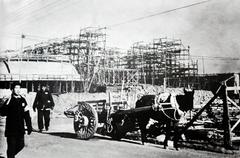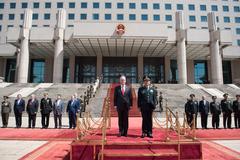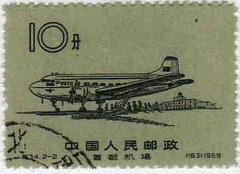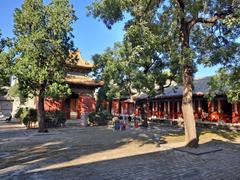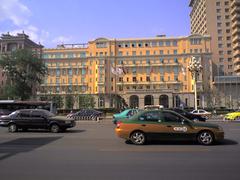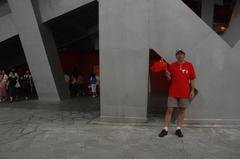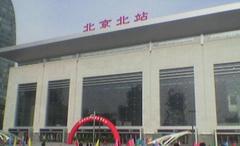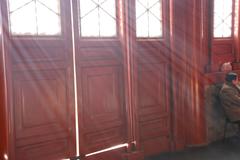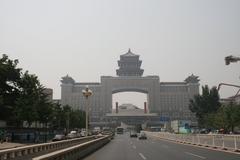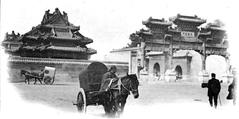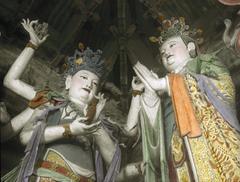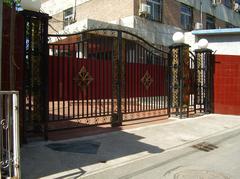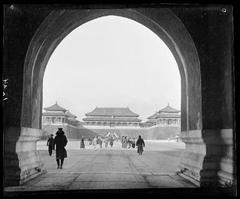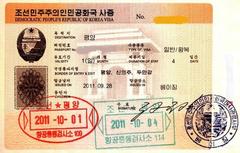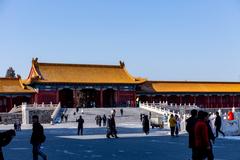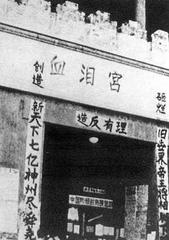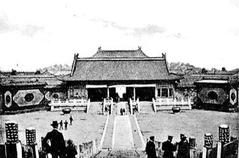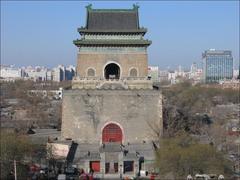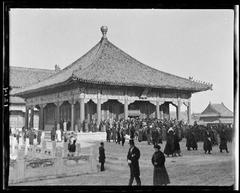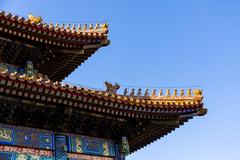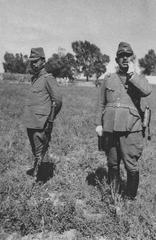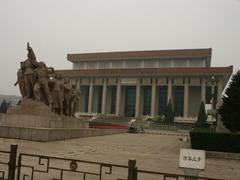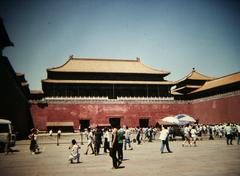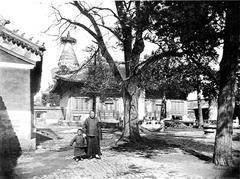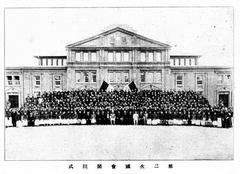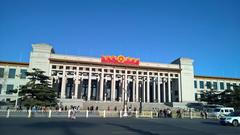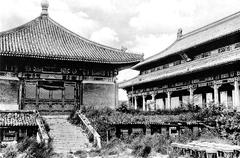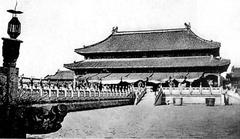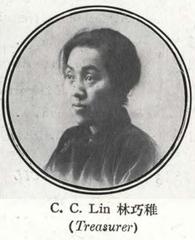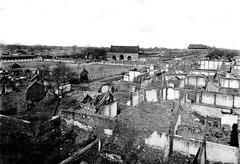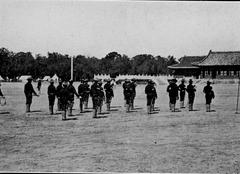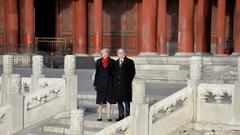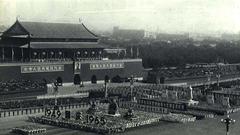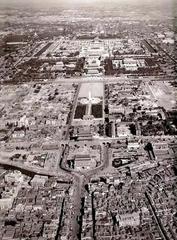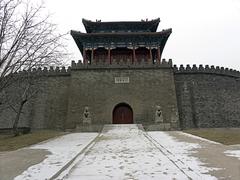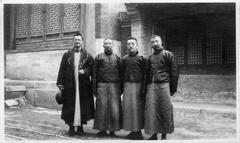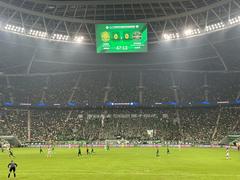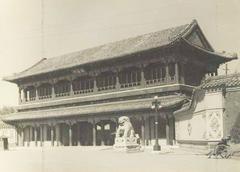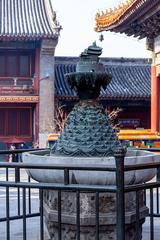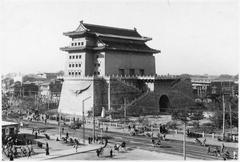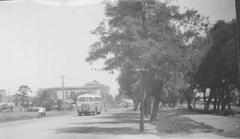Peking University International Hospital
Peking University International Hospital Visiting Hours, Tickets, and Guide to Beijing Historical Sites
Date: 04/07/2025
Introduction: Peking University International Hospital (PKUIH)
Peking University International Hospital (PKUIH) is a leading example of modern healthcare in Beijing, China. As the eighth affiliated hospital of Peking University, PKUIH is located within the Zhongguancun Life Science Park, a renowned hub for biomedical research and technological advancement in northern Beijing. With a facility spanning up to 440,000 square meters and an investment of 3.2 billion RMB, PKUIH stands as one of the largest single medical buildings in Asia. Its mission integrates advanced patient care, innovative research, and education, making it a flagship institution in China’s healthcare system.
PKUIH’s proximity to the Zhongguancun subway station (Line 4) and accessible bus routes ensures convenient access for both local and international visitors. The hospital welcomes patients and visitors daily, with standard visiting hours from 8:00 AM to 5:00 PM on weekdays. Multilingual services through its International Medical Center provide support for non-Chinese speakers. While public tours are limited, arrangements for visits can be made via hospital administration, appealing to medical tourists and international collaborators. In addition to its medical offerings, the hospital’s modern architecture and nearby attractions—such as Beijing Olympic Park and the 798 Art District—further enrich the visitor experience.
For the most current information on visiting hours, appointment scheduling, and international patient services, consult the official PKUIH website and the Peking University Office of International Relations Medical Service page.
Contents
- Introduction
- Institutional Position and Strategic Importance
- Visiting Hours and Appointment Booking
- Directions and Transport Options
- Accessibility and Visitor Amenities
- Scope of Services and Specializations
- Integration with Beijing’s Healthcare System
- Patient-Centered Care and International Standards
- Medical Tourism and International Healthcare
- Research and Academic Leadership
- Infrastructure and Capacity
- Community Engagement and Public Health
- Comparative Standing Among Beijing Hospitals
- Frequently Asked Questions (FAQs)
- Visual and Interactive Resources
- Plan Your Visit
Institutional Position and Strategic Importance
PKUIH, as the eighth affiliate of Peking University, is strategically positioned in the Zhongguancun Life Science Park (Peking University International Hospital - Wikipedia). Its scale and investment underscore its role as a flagship medical institution in Asia, integrating healthcare delivery, teaching, and research. The hospital’s partnership with Peking University Health Science Center (PUHSC) ensures access to leading expertise and resources (PUHSC - Wikipedia).
Visiting Hours and Appointment Booking
- Visiting Hours: Weekdays from 8:00 AM to 5:00 PM. Weekend hours may vary; consult the official website for updates.
- Appointments: Bookings can be made online, by phone, via WeChat or Alipay, or at onsite self-service machines (PKU OIR Medical Service).
- International Services: The International Medical Center provides English-language consultations and translation services.
Directions and Transport Options
- Subway: Closest station is Zhongguancun Station (Line 4), followed by a short taxi or bus ride.
- Bus: Several lines serve the Zhongguancun Life Science Park area.
- Taxi/Car: Onsite parking is available.
Accessibility and Visitor Amenities
PKUIH is fully accessible, offering ramps, elevators, and staff trained to assist patients with disabilities. Facilities include comfortable waiting areas, dining options, and multilingual support for international patients.
Scope of Services and Specializations
PKUIH comprises 36 medical centers and 49 clinical disciplines, with specialties in cardiovascular medicine, oncology, ophthalmology, women and children’s health, neuroscience, urology, and renal disease. Advanced diagnostic and therapeutic technologies ensure high-quality, evidence-based care (Peking University International Hospital - Wikipedia).
Integration with Beijing’s Healthcare System
As a teaching hospital and research hub, PKUIH is integral to Beijing’s healthcare infrastructure. It provides comprehensive services and accepts a broad range of insurance policies, including Beijing social medical insurance, commercial insurance, and foreign insurance (Peking University International Hospital - Wikipedia).
Patient-Centered Care and International Standards
PKUIH is committed to compassionate, personalized care while upholding strict ethical and quality standards (PKUIH Vision & Mission). The hospital follows rigorous quality assurance protocols and adheres to both national and international medical standards (PKUIH Quality).
Medical Tourism and International Healthcare
PKUIH is a prominent destination for medical tourists, offering multilingual staff, streamlined appointment systems, and culturally sensitive care. Its location near key transportation hubs makes it easily accessible for international patients (PKU OIR Medical Service).
Research and Academic Leadership
As an academic hospital, PKUIH collaborates with Peking University faculties to promote medical research, innovation, and education. It regularly hosts conferences and training programs that contribute to the advancement of healthcare in China (PUHSC - Wikipedia).
Infrastructure and Capacity
The hospital features 1,800 approved beds, modern operating rooms, and intensive care units. Its design emphasizes patient comfort and operational efficiency (PKU OIR Medical Service).
Community Engagement and Public Health
PKUIH supports various public health initiatives, health education programs, and collaborates with government agencies to improve community health and emergency response (PKUIH Vision & Mission).
Comparative Standing Among Beijing Hospitals
PKUIH is among Beijing’s top hospitals, standing out for its size, modern infrastructure, international focus, and integration with academic research (TravelChinaGuide - Beijing Hospitals).
Frequently Asked Questions (FAQs)
Q: What are the visiting hours at PKUIH?
A: Weekdays from 8:00 AM to 5:00 PM. Confirm weekend hours on the official website.
Q: How can I book an appointment?
A: Appointments are available online, by phone, via WeChat or Alipay, or onsite.
Q: Is parking available?
A: Yes, onsite parking is provided for visitors and patients.
Q: Are there services for international patients?
A: The International Medical Center provides English-language services and translation.
Q: Is the hospital accessible for disabled visitors?
A: Facilities include ramps, elevators, and trained staff for assistance.
Visual and Interactive Resources
Explore virtual tours and facility maps on the official PKUIH website for a comprehensive overview of the hospital’s layout and amenities.
Plan Your Visit
For up-to-date visiting hours, appointment bookings, and detailed information, visit the official PKUIH website or the Peking University Office of International Relations Medical Service page.
Guide to the Forbidden City: Beijing’s Iconic Historical Monument
Introduction
The Forbidden City, centrally located in Beijing, is one of the world’s most significant cultural landmarks. Formerly home to 24 emperors of the Ming and Qing dynasties, the palace complex is an outstanding example of traditional Chinese architecture and a UNESCO World Heritage Site. Visitors are drawn by its history, grandeur, and extensive art collections.
History and Significance
Built between 1406 and 1420, the Forbidden City was the center of Chinese imperial power for nearly five centuries. Its design reflects principles of harmony and hierarchy, with 980 buildings spread over 180 acres. The site houses invaluable artifacts, paintings, and relics that reveal the legacy of China’s dynasties.
Visitor Information
Opening Hours
- Open Tuesday to Sunday: 8:30 AM – 5:00 PM (last entry at 4:10 PM)
- Closed Mondays (except national holidays)
Tickets and Admission
- Peak season (April–October): 60 RMB
- Off-peak (November–March): 40 RMB
- Free entry for children under 1.2 meters, seniors over 70, and select groups
- Tickets should be purchased in advance online; bring valid ID (Official Forbidden City Website)
Guided Tours and Audio Guides
- Multilingual audio guides and guided tours are available at the entrance and online.
Getting There and Accessibility
- Subway: Take Line 1 to Tiananmen East or Tiananmen West.
- Bus: Multiple lines serve north and south gates.
- Accessibility: Ramps and elevators at main points; special assistance on request.
Must-See Highlights
- Meridian Gate: Southern main entrance
- Hall of Supreme Harmony: Venue for imperial ceremonies
- Palace of Heavenly Purity: Former emperor’s residence
- Imperial Garden: Traditional gardens at the north end
Tips for Visitors
- Arrive early to avoid crowds, especially during holidays.
- Wear comfortable shoes; the complex is vast.
- Photography is allowed in most outdoor areas (no flash or tripods inside).
- Food and drink are prohibited inside the palace grounds; dining options are available nearby.
Nearby Attractions
- Tiananmen Square: Immediately south of the Forbidden City.
- Jingshan Park: North of the palace, offers panoramic views.
- Wangfujing Street: Shopping and local cuisine within easy reach.
Special Events and Exhibitions
Seasonal exhibitions and cultural events occur throughout the year. Check the official website for updates before your visit.
Frequently Asked Questions (FAQ)
Q: Can I buy tickets on the day of my visit?
A: Yes, but advance online booking is highly recommended, especially during peak seasons.
Q: Is the Forbidden City suitable for children?
A: Yes, but supervision is advised due to the size of the complex.
Q: Are guided tours available in English?
A: Yes, both guided tours and audio guides are available in English.
Q: Can I bring food or large bags?
A: Food is not allowed inside; large bags are subject to security checks.
Q: What is the best time of year to visit?
A: Spring and autumn offer pleasant weather and fewer crowds.
Additional Resources
Summary: Visiting Peking University International Hospital
Peking University International Hospital exemplifies the fusion of modern medical care, academic leadership, and patient-centered services in Beijing’s healthcare landscape. Its advanced facilities, specialized treatment centers, and commitment to international standards make it a top choice for both local and international patients. Convenient transportation, comprehensive multilingual support, and a welcoming environment further enhance the visitor experience.
Whether your interest lies in cutting-edge healthcare, academic collaboration, or exploring medical tourism, PKUIH stands as a model of innovation and excellence. For the latest updates and to plan your visit, refer to the official PKUIH website and the Peking University Office of International Relations Medical Service page.
Sources and Official Links
- Peking University International Hospital - Wikipedia
- PKU OIR Medical Service
- PUHSC - Wikipedia
- PKUIH Vision & Mission
- TravelChinaGuide - Beijing Hospitals
- Official Forbidden City Website
- Beijing Tourism Bureau
- Audiala - Your Travel Companion App
